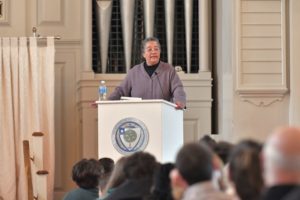@dhanno: Talking about race
The hatred and violence that was on display in Charlottesville, Va., during the summer is hard to understand. It has been even more difficult to imagine reasoning with such blind anger and inhumanity. As a means to help students think about racism and prejudice and the social environment that gives it life, Wheaton faculty members organized a teach-in that drew more than 400 students, faculty and staff members into Cole Memorial Chapel in mid-September.

The teach-in began by sharing insights about race that are drawn from scholarship in various disciplines, including an anthropological view on race as a social construct, a historical look at how ideas about race have shifted over time and a sociological consideration of the ways in which racial biases are embedded in society. Although brief, each professor’s comments challenged what we think we know about race, providing much material for the small group discussions that followed. It was a shining example of the value of scholarship in helping us to understand complex issues as well as the commitment of faculty to working together and engaging with students beyond the classroom.
These are incredibly valuable conversations. Our world offers plenty of evidence that we need to build common understanding as well as empathy and respect for others. In fact, we need not look beyond our own campus. The controversy that erupted in fall 2017 over a student’s Halloween costume and the pain, hurt and anger expressed by students and alumni make clear that we have a great deal of work to do in ensuring that Wheaton is as welcoming and inclusive as we would like it to be. The emotions that it raised transcended that one incident, reflecting experiences at Wheaton and in the world beyond campus.
The fact that Wheaton is not perfect should not be a surprise. The college community is a microcosm of the larger society to which we all belong. The prejudice and divisiveness and anger that typifies public conversations today does not create a constructive environment for civil dialogue, deeper understanding and positive change. Yet I believe—and I know many others share this conviction—that our college can be better, that we can be a model for what it means to be a diverse and inclusive community.
A teach-in cannot be our sole response to the issues that we face at Wheaton and in the wider world, but the insights offered by our professors make a valuable contribution to building the kind of understanding that is vital to progress. In place of heated rhetoric, the faculty introduced evidence and insight from their academic disciplines, providing a basis for common ground. As an educational institution, it is a particularly appropriate part of what we can do and what we need to do.
At the same time, the college can and will make systemic and programmatic changes that increase diversity on campus and improve the campus climate. This ongoing commitment has driven the work of the Task Force on Inclusion and Diversity that was formed in 2016. Through its engagement with faculty, staff and students, that group has developed a comprehensive plan designed to help the college realize its goal to be a welcoming and supportive community for people from every background.
We have work to do as a college and a community. I personally feel a great sense of urgency to make progress. Each of us has a role to play by opening our minds to fully understand the experiences of others. The faculty and staff who organized the teach-ins this fall made a major contribution to that effort. And I invite every member of the community to contribute by participating in the life of the college, adding your voice and perspective to create a truly inclusive Wheaton.
